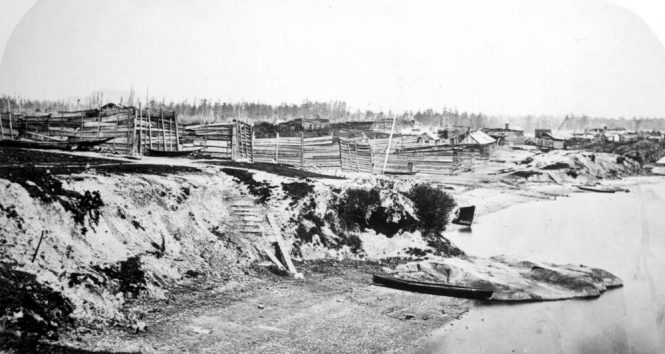[et_pb_section admin_label=”section”][et_pb_row admin_label=”row”][et_pb_column type=”4_4″][et_pb_text admin_label=”Text” background_layout=”light” text_orientation=”left” text_font=”Open Sans||||” text_font_size=”13″ use_border_color=”off” border_color=”#ffffff” border_style=”solid”]
European immigrants, in the very beginnings of colonial settlement on Vancouver Island, began to occupy the territory that historically belonged to the Lekwungen. The ancestral land of the Lekwungen, which consisted of a climate with hot, dry summers and cool, moist winters, was located along the Southeastern coast of Vancouver Island and is now occupied by the urban city of Victoria, BC.[1] European settlers, specifically fur traders, were attracted the Lekwungen’s territory, in part, due to the open prairies created by annual burnings in which the Lekwungen burned forests in order to create meadows.[2]
Despite any reservations the Lekwungen had regarding the settlement of Fort Victoria, overall they had a relatively positive response to the arrival of European immigrants. The Lekwungen were welcoming of colonial settlers due to their undying intention to keep their ancestral right to control their territory, as well as the idea that their role in and partial control over the development of Fort Victoria would bring their community a great deal of profit.[3] Furthermore, in addition to their belief that encouraging and participating in the construction of the settlement would give them a say in its future, it is likely that the Lekwungen participated in the development of colonial Fort Victoria due to the fact that community construction was a collective and uniting practice that was a significant part of their culture.[4]
The Lekwungen are often considered to have been one of the best-situated Indigenous groups in terms of potentially social and economic success in the developing European settler society due to their close proximity and active participation in the economy.[5] In addition to the Lekwungen welcoming European immigrants, colonial settlers on Vancouver Island also saw value in having the Lekwungen as allies. The sense of ownership that the Lekwungen possessed produced a willingness to be employed at an inexpensive cost, which was a quality that settlers and the Hudson’s Bay Company found particularly valuable.[6] Similarly, the Lekwungen were valued because of their ability to provide the settlement of Fort Victoria with the bulk of its food necessities due to their knowledge of the land and expertise in hunting, gathering, and fishing (qualities the settlers lacked).[7]
[/et_pb_text][et_pb_text admin_label=”Text” background_layout=”light” text_orientation=”left” use_border_color=”off” border_color=”#ffffff” border_style=”solid”]

[/et_pb_text][et_pb_text admin_label=”Text” background_layout=”light” text_orientation=”left” text_font_size=”10″ use_border_color=”off” border_color=”#ffffff” border_style=”solid”]
[1] John Sutton Lutz, Mukúk: A New History of Aboriginal-White Relations. Vancouver, BC: UBC Press, 2008, 66. [2] Ibid., 67. [3] Ibid., 73. [4] Ibid., 71. [5] Ibid., 50. [6] Ibid., 75. [7] Ibid.
[/et_pb_text][/et_pb_column][/et_pb_row][/et_pb_section]
